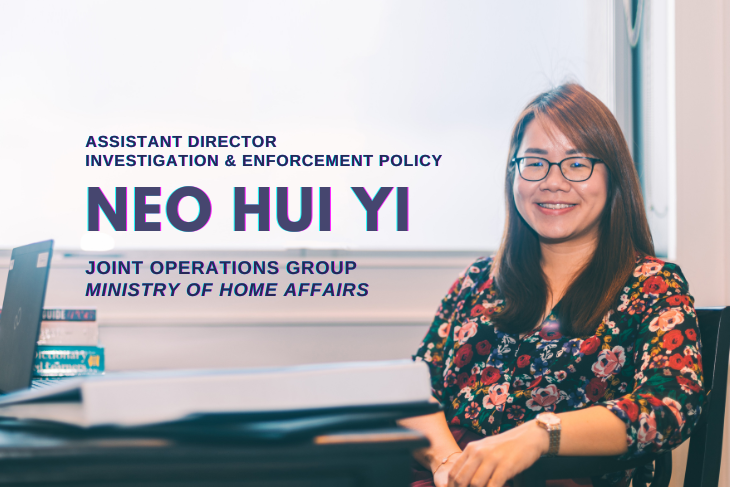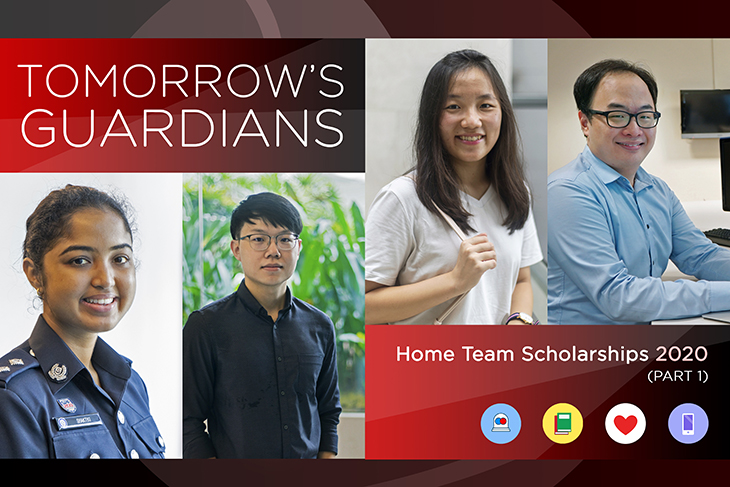
GRAPHIC: Elaine Lee | PHOTOS: Joash Tan
If you harbour ambitions to support the safety and security of Singapore in a variety of roles, but are unsure what the role of policy-making really entails for civilian officers, we have crafted a handy guide with the help of Hui Yi, Assistant Director overseeing investigation and enforcement policies at
Ministry of Home Affairs Joint Operations Group.
A Political Science graduate from the National University of Singapore with a Masters of Arts in National Security from King's College London, Hui Yi started out in the
Central Narcotics Bureau (CNB) in 2014 handling strategic planning, and spent the last six years doing policy work in the Ministry HQ.
Hui Yi has been involved in reviewing policies and measures relating to racial and religious harmony and foreign interference, and her current portfolio concerns investigative and enforcement operations to ensure the policies are aligned and deliver the intended operational objectives. She shares with us six lessons she has learnt as a Generalist officer.
1. Have a Willingness to Learn
Before her first stint at MHQ in the Policy Development Division, Hui Yi’s work on strategic planning at CNB after she first graduated in 2014 was a vastly different domain from policy planning.
From strategising CNB’s long-term goals and planning events, the switch to policy planning posed a different set of challenges.

Hui Yi discussing legal lingos with her colleague.
“In policy work, there are a lot of legislative reviews and a major challenge I encountered was understanding the varied legal lingos,” she explained. “As I am not legally trained, I had to read widely to get the hang of it.
“Thankfully, there were courses such as “Law Making and Policy” conducted by the Attorney-General Chambers to guide officers like us to translate our policy intents into legislations.”
2. Be Interested in Global Safety and Security Trends
Hui Yi’s work often involves researching and being aware of international and regional issues faced by the Ministry’s overseas counterparts.
“One example is the issue regarding online harms. Many countries are in the midst of working on legislations to protect their citizens from online harms, and my job is to study their experiences to see if they are relevant to Singapore’s context, and how we can benchmark ourselves against the international community,” explained Hui Yi.
Hui Yi noted that her overseas experience also helped her to observe first-hand how different social values can create a different set of situations and influence the management of public order.

“When I was residing in London during my MHA-sponsored Master’s study, Tube strikes happened quite frequently in the city and the government didn’t step in for it was widely accepted that the workers have their rights to demand for better working conditions,” she said.
“While I don’t disagree with the country’s emphasis on human rights, the strikes do affect the citizens’ routines and impact the functioning of businesses and services. This experience made me better appreciate the Home Team as I realised our policies have a bearing on public order and security.”
3. Possess Clarity in Your Writing
Conveying clarity in one’s thinking through writing succinctly will help tremendously in the course of work.
Hui Yi noted that it is important to write in a manner where your colleagues and stakeholders are clear about what one’s intentions and goals for a particular policy should look like.

“A lot of my discussions are conducted with internal and external parties such as frontline uniformed officers across the Home Team Departments, other Ministries, as well as engagements with the public such as private or social organisations on issues like online harms, sexual violence and family matters,” she said.
“Hence, it is important for us to write with clarity so that all parties are on the same page with us. Otherwise, we will just be circling around the same topic for a long time.”
4. Patience is Key
Policy-making is a long-drawn process. One example is the
Foreign Interference Countermeasures Act (FICA) passed by Parliament in October 2021, that Hui Yi and her team worked on.
As the first piece of legislation of its kind here, Hui Yi revealed that it was developed and tweaked over the years based on changing local operational environment and overseas developments.
“It was first a review on an existing piece of legislation before it evolved further to become the new Act that we see today given the increasing threat of foreign interference,” she said.
5. Don’t Lose Sight of Your Goals
It is also important to not lose sight of the policy’s original intent. According to Hui Yi, the outcome that a team hopes to achieve may change and evolve for several reasons.
These often include external factors such as policy changes in other countries or the occurrence of an incident either locally or overseas that changes the team’s threat perception.

“Those developments might confuse the original intention of our policy, and we therefore must not lose sight of our fundamental intention: why we hope to introduce or review a particular policy,” shared Hui Yi.
Despite this, Hui Yi isn’t deterred but in fact spurred on to push through, as she finds it meaningful to be able to make changes that enhance investigation and enforcement capabilities for frontline officers.
6. Lastly, Value Your Stakeholders
Be they internal or external parties, the stakeholders to the policy are the most important people policymakers need to work with to make the policy come to fruition.
“Policy-making may sound like a grand term and a high-level issue, but in actual fact, it really boils down to a lot of teamwork and partnership,” admitted Hui Yi.

“There is no instant gratification in policymaking and the results of a piece of policy can only be seen years down the road. Given the long-drawn process, it is important to value the various stakeholders to cultivate good relations to work in the most efficient manner.”
MHA Civilian Scholarship
The MHA Civilian Scholarship is awarded to outstanding individuals who are passionate about strengthening Singapore’s security and public safety. Recipients of the MHA Civilian Scholarship may choose from a variety of exciting and rewarding Home Team careers according to their interests and aspirations. This civilian scholarship offers six career tracks: a Generalist track and five Specialist tracks: Intelligence; Psychology; Commercial Affairs; Science and Technology; and Internal Security.
Read other articles in this series
Intelligence track - No Glitches in this Matrix: The Unseen Work of a Crime Analyst
Commercial Affairs track - Truth Behind the Drama: Busting Money Laundering Myths
Internal Security track - Quiz: Are You Cut Out to be an ISD Officer?
Be inspired by the Home Team, on Telegram: t.me/hometeamnews









